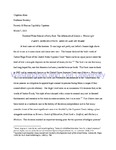Troubled Wake Behind a Pretty Boat: The Aftermath of Gideon v. Wainwright

View/
Author
Allen, Crighton T.
Subject
Washington and Lee University, Shepherd Poverty Program
Right to counsel
Discrimination in criminal justice administration
Public defenders
Legal assistance to the poor
Metadata
Show full item recordDescription
Capstone; [FULL-TEXT FREELY AVAILABLE ONLINE] Crighton T. Allen is a member of the Class of 2011 of Washington and Lee University. The arguments for ensuring that all people, regardless of income level, receive effective assistance of counsel bear tremendous moral weight. The Supreme Court of the United State recognized as much in its historic ruling in Gideon v. Wainwright. As it stands today, however, the wake of that case has brought to light many issues that the Justices on the High Court did not foresee in handing down their judgment. These issues present real barriers to seeing that income truly does not bear on an individual's ability to receive a fair trial. The issues are complex and multi-layered; each may be likened to a Russian matryoshka doll in that they all bear inside them smaller issues that derive from the parent issue. Though grave the threat the lack of funding and funding disparities, case overload, judicial outlook, and the contract system present to the current state of indigent defense, our criminal justice system need not placidly submit to them. There is still time to rescue poor defendants from the travesty of justice that all too many of them are made to face. By frankly acknowledging the system's current shortcomings and committing to reform efforts and policy changes, those who care about this issue can cooperate to create a new indigent defense system that can ensure that quality counsel, with manageable caseloads and adequate funding and resources, will be assigned to each man, woman, and child necessitating a public defender. When this occurs, Americans can point, with due pride, to a criminal justice system in which reality finally measures up to the high ideals established by the Supreme Court because of the courage of a man named Gideon. [From the Conclusion] Crighton Allen